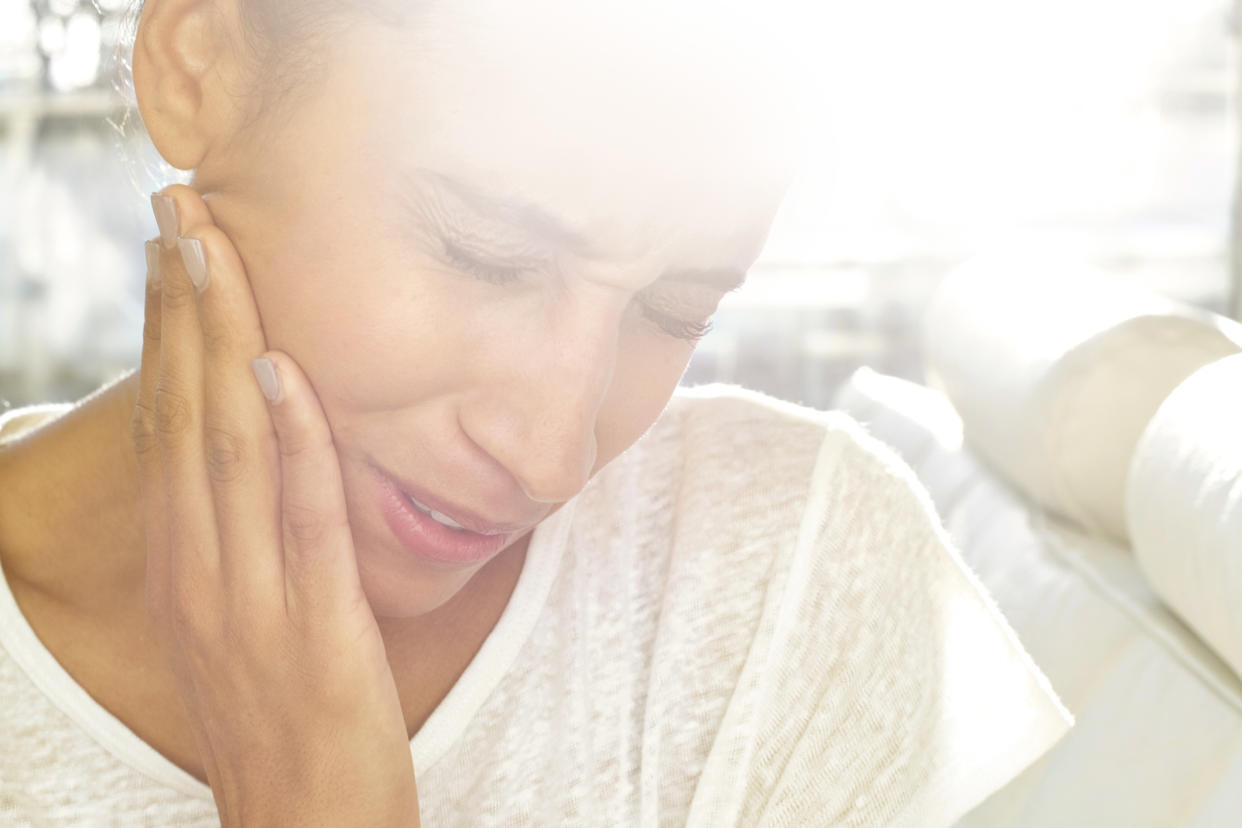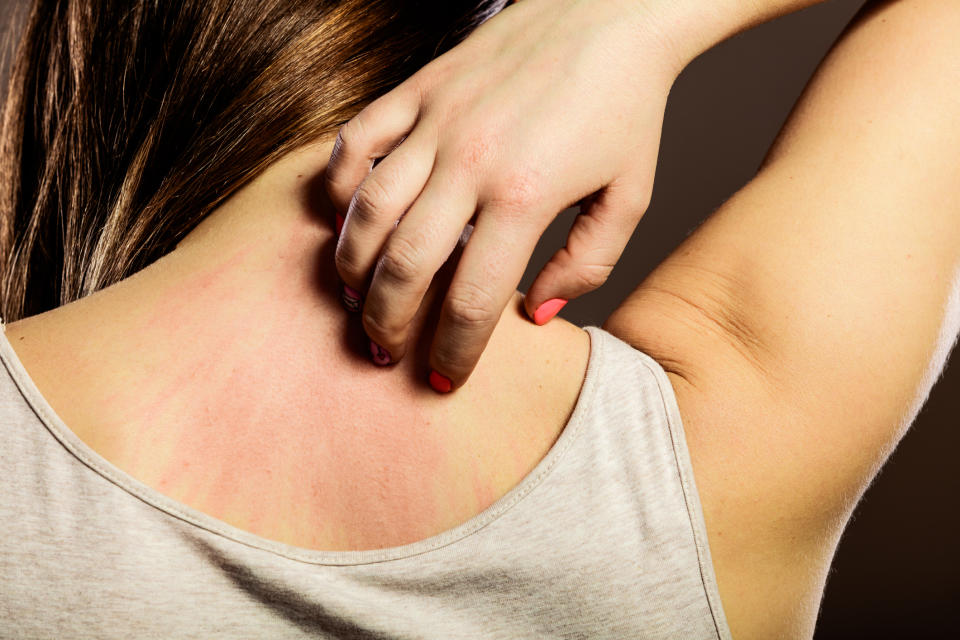Surprising symptoms of menopause, including toothaches and itchy skin

When you think of the symptoms of the menopause, it’s likely you’ll think about hot flushes, night sweats and mood swings, but there are some other lesser known indications that the menopause could be approaching.
In fact experts believe there can be up to around 60 symptoms associated with the menopause and some are a little on the surprising side.
"The menopause (and perimenopause which predates it) is highly complex; there is so much more to it than the well-known symptoms of night sweats, memory loss and hot flushes but in most cases, these are the signs women think they should be looking out for,” explains Stephanie Taylor, women’s health expert and managing director of pelvic healthcare company Kegel8.
"That's why other, subtler or seemingly unrelated changes to the body – like dry skin, incontinence, tooth ache, vaginal dryness or late onset allergies - can end up being dismissed."
Surprising symptoms of menopause
Tooth ache
"Like your skin and vagina, your mouth can also become drier during the menopause," explains Taylor. "When your mouth isn’t lubricated, bacteria grows at a faster rate which can lead to tooth decay and gum disease."
Itchy skin
One of the lesser known symptoms of menopause is itchy skin. "This is caused by a decrease in the hormone, oestrogen, which is related to the natural oils that keep our skin moisturised," explains Dr Samantha Wild, from Bupa Health Clinics.
"The itchy sensation can occur anywhere on the body, even on your elbows."
Dry, irritable skin
As well as itchiness, skin can become dry and irritable when approaching or during the menopause. "Falling oestrogen levels means the skin’s collagen levels become depleted very early on in the menopause," says Taylor. "This can leave you with dry, flaky and itchy skin from head to toe."

Incontinence
According to Taylor the menopause can cause your pelvic floor muscles to weaken, meaning less support for your pelvic organs like your bladder. "This can leave you with frequent, sudden urges to urinate, which is often followed by involuntary leakage of urine," she adds.
Heart flutters
According to Taylor surges in hormones during the menopause can cause heart palpitations while your body rebalances. This is most common in the perimenopause when the largest shifts in hormone levels occur. "Symptoms include a short-lived episode of the heart racing, pounding, fluttering or beating irregularly," Taylor adds.
Burning sensation on the tongue
Another unusual symptom of menopause is a burning sensation on the tongue. "Some women also experience a stinging or tingling feeing," Dr Wild says. "This is caused by a hormone imbalance and can be triggered by spicy food or a strong-tasting flavour, such as toothpaste or extra strong mints."
Dryness down below
Vaginal atrophy, otherwise known as vaginal dryness, is very common during the menopause and is caused by a drop of oestrogen which halts the production of mucus in the vagina. "This dryness can not only put you at a higher risk of developing a urinary tract infection, but it can also make sexual intercourse unpleasant and sometimes painful," Taylor adds.
Electric shock sensation
Surprisingly many women have documented feeling short sharp electric shocks on their skin. "This isn’t yet completely understood, but it’s thought it could be down to hormonal imbalances affecting how the brain interprets and sends messages to and from the nervous system," explains Taylor.
Breast tenderness
"Breast tenderness during menopause can occur due to hormonal fluctuations, especially changes in oestrogen and progesterone levels. "These hormones influence breast tissue, and their imbalance can lead to increased sensitivity and discomfort," explains Jamie Winn, medical director at Universal Drugstore. "While breast tenderness is more common in the perimenopause phase, it can still be experienced during menopause due to these hormonal shifts.”
Thinning hair
During menopause, many women experience thinning hair due to hormonal changes. "As oestrogen levels decrease, it can shift the hair growth cycle, resulting in hair becoming finer and thinner," explains Winn. Additionally, declining hormone levels can affect hair follicles and reduce their ability to produce new hair." Genetics, stress, and nutritional factors can also contribute to hair thinning during menopause.
Watch: NHS should offer women therapy for the menopause, new guidance says
Dizziness or vertigo
Dizziness or vertigo during menopause can be attributed to hormonal fluctuations. "These hormonal shifts can affect the inner ear's fluid balance and its role in maintaining balance and equilibrium, leading to dizziness and vertigo," Winn explains. Other factors such as changes in blood pressure, stress, and age-related factors can also contribute to these symptoms.
Allergies
Suddenly finding yourself sneezing when you’re around next door’s cat? A new allergy could be an indication of the menopause. "Even if you haven’t had an allergy to something before, hormonal imbalances can change all that," explains Taylor. "From eczema and hay fever, to food allergies, developing mid-life allergic reactions isn’t uncommon."
Joint pain
Your aching joints might not be down to an extra-vigorous work out in the gym. “Oestrogen plays a role in managing inflammation levels throughout the body, so without it, women are more at risk of developing joint pain which, in some cases, can lead to acute arthritis," Taylor explains.

Change in your nails
Spotted your nails aren’t quite looking and feeling their best, it might be more than an overdue manicure. According to Dr Wild nails can become dry and brittle which is also linked to the drop on oestrogen during the menopause. She recommends drinking plenty of water and oestrogen replacements to counter balance the brittleness.
Unpleasant body odour
Oh the joys! Though it’s well known that hot flushes and night sweats can cause you to perspire more during the menopause, the smell of your sweat can also change. According to Taylor some women experience a bad case of "BO" which is difficult to shift.
How to overcome symptoms
If you’re suffering with any of the symptoms above, Taylor says there are actions you can take to feel better: "From changing your diet, reducing your alcohol consumption, taking vitamins and supplements, doing the right kind of exercises (not forgetting pelvic floor training) to seeking medical treatment and alternative health therapies like acupuncture."
Don’t suffer in silence. If you’re worried about how the menopause could be impacting your health and wellbeing, consult your GP or a trained health professional as soon as possible.
Menopause: Read more
This is why you gain weight when you start menopause (Yahoo Life UK, 3-min read)
The 3 top concerns menopausal women have in the workplace, according to study (Yahoo Life UK, 5-min read)
'Going through early menopause at 15 made me feel like a failure' (Yahoo Life UK, 13-min read)



